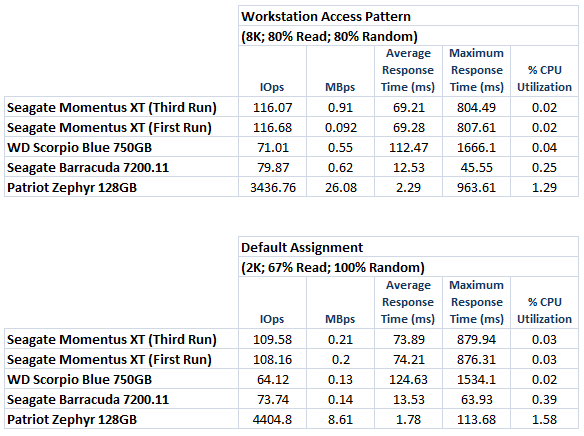
Our Test Methodologies: Under each test condition, the Solid State Drives tested here were installed as secondary volumes in our testbed, with a standard spinning hard disk for the OS and benchmark installations. The SSDs were left blank without partitions wherever possible, unless a test required them to be partitioned and formatted, as was the case with our ATTO, Vantage, and CrystalDiskMark benchmark tests. And all drives were secure erased prior to the start of any testing. Windows firewall, automatic updates and screen savers were all disabled before testing. In all test runs, we rebooted the system and waited several minutes for drive activity to settle before invoking a test.
 |
| HotHardware Test System |
| Intel Core i7 Powered |
|
Processor -
Motherboard -
Video Card -
Memory -
Audio -
Hard Drives -
|
Hardware Used:
Intel Core i7 965
Gigabyte GA-EX58-Extreme
(X58 Express Chipset)
GeForce GTX 280
6144MB Corsair DDR3-1333
CAS 7
Integrated on board
Seagate Momentus XT 500GB
Seagate 7200.11 1.5GB
WD Scorpio Blue 750GB
Patriot Memory Zephyr 128GB |
OS -
Chipset Drivers -
DirectX -
Video Drivers -
|
Relevant Software:
Windows 7 Ultimate
Intel 9.1.1.1025 w/ Matrix Storage
DirectX 11
NVIDIA ForceWare v196.34
Benchmarks Used:
HD Tach v3.0.1.0
ATTO v2.46
CrystalDiskMark v3
PCMark Vantage
SiSoftware Sandra 2010 SP1
|
 |
| IOMeter |
| I/O Subsystem Measurement |
|
In the following tables, we're showing two sets of access patterns with IOMeter; one with an 8K transfer size, 80% reads (20% writes) and 80% random (20% sequential) access and one with IOMeter's default access pattern of 2K transfers, 67% reads and 100% random access. Both tests were conducted with 8 worker threades.

The adaptive memory technology of the Seagate Momentus XT doesn't seem to adapt to the workloads presented by IOMeter, as is evidenced by the similarity in the results between the first and third runs, but the drive does perform well, relative to the other hard drives we tested. With both the default and our workstation access patterns, the Momentus XT finishes well out in front of the other hard drives we tested. The SSD, however, dominates all around.
![]()
![]()








